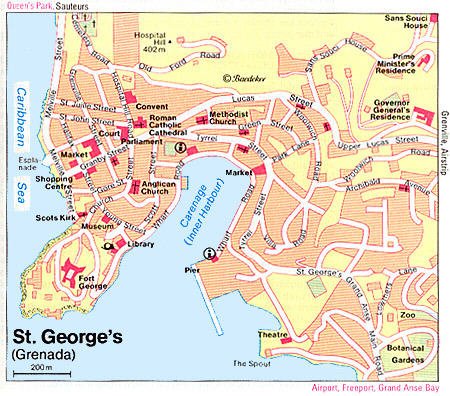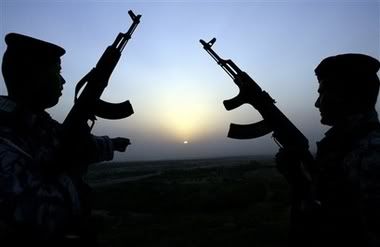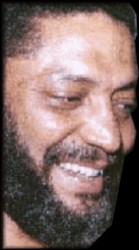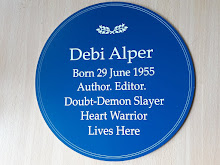Previous posts in this series:The time has come - how I came to the decision to blog the Revo
The Revo Blog. Part 1 - background to Grenada
The Revo Blog. Part 2 - background to me
The Revo Blog. Part 3 - Feb-March 1982 (1 of 2)
The Revo Blog. Part 3a - why 'Revo'?
The Revo Blog. Part 4 - Feb-March 1982 (continued)
The Revo Blog. Part 5 - April 1982 - June 1983. London
The Revo Blog. Part 6 - June-Sept 1983
The Revo Blog. Part 7 - relationships
The Revo Blog. Part 7a - Faye's film
The Revo Blog. Part 8 - Sept - Oct 1983. Rumours
The Revo Blog. Part 9 - Oct 1983. The Last Days of the Revo
Wednesday 19th October 1983. Coup Photo of Maurice Bishop and Unison Whiteman from the 'Lost Bishop Photos'
Photo of Maurice Bishop and Unison Whiteman from the 'Lost Bishop Photos'
NB: The photos are fascinating, but beware of the rest of the content on this site!
As soon as I wake up, I turn on the radio. The 7.00am news on Radio Free Grenada talks of possible reconciliation between Maurice and the Central Committee. It also reports several people - mostly school students - have been arrested as a result of the demo in St Andrews yesterday.
It doesn't surprise me that students are in the forefront of the protests. The Revo's energy and zest for life is largely a result of the relative youth of its main supporters. School students are the pioneers, the flowers of the revolution. Young, educated and idealistic, these young people's vision is unsullied by memories of Grenada's colonial past. It's the future that they concentrate on and they believe it belongs to them.
At 8.15am RFG broadcasts a statement from the Ministry of Education. The tone is heavier than anything we've heard so far. Students are being led by counters (counter revolutionaries) we're told. Anonymous phone calls have been made to schools giving details of demos and saying students should be allowed to attend.
But the duty of students is to study - and nothing else! This is shocking and goes against everything these young radicals have previously been led to believe about their role in the vanguard of the Revo.
At some point in the morning, I say goodbye to C with a heavy heart. H and B are both ill and holed up in their bedroom and I've come to rely on C more and more over the last couple of weeks. She's going to Carriacou, Grenada's dot-in-the-ocean sister island, for a few days to do some work for a UK Law Centre on behalf of a Grenadian woman in London. She'd thought about postponing the trip, but when to? Who can say whether things will be better or worse in a few days time?
M left early this morning for his job as 'bag boy', collecting fares on a local bus, and L is off somewhere on the hustle. I go to the local shop and meet PC who gives me waternuts and callalloo for H. He tells me there will be 'a war on the streets of St Georges today' and that under no circumstances should I attempt to go into town. There's talk of shops shutting so I get as much food in as I can.
Back home, I start cooking cornmeal porridge for the invalids. I'm halfway through when our gas cylinder, which fuels our two burner cooker, runs out. At the best of times, this is a pain. You have to lug the empty cylinder into town and exchange it for a full one, which is too heavy for one person to carry alone. Instead, I go to C's house and swop our empty cylinder for her fuller one and finish off the porridge back home.
At 11.00am RFG goes off the air. This silence is far more frightening than when they were broadcasting things no one wished to hear. On the midday news, Trinidad radio says that Maurice has been freed by supporters who stormed his home, meeting only token resistance. He's now in St Georges with a crowd of 3000 people. There follows an exclusive interview with Maurice's mother.
Carna news says that Louison has been arrested and that all international phone lines are down now. They are receiving their information via anonymous telex messages.
At 1.30pm 610 News says that the army has opened fire on people in the market.
I'm here in Grenada. Just over the hill behind our house something huge is going on, history is being made. Yet the only access I have to information is the radio, from regional stations broadcasting from miles away. Twitchy and anxious, I can't settle and pace up and down, stopping only to fiddle with the radio. I decide to tape the broadcasts. Whatever is happening, it's clear we're living through history and I feel the need to record and bear witness.
Then something happens that changes my attitude. H says that now our cylinder has run out, I have reason to go into town and should do so. I'm shocked! If I do go in, I tell her, I'm going to have to be able to duck and dive, react and run if necessary. I can't do that while dragging round an empty gas cylinder, let alone a full one. And anyway, I can't imagine the shops will be open.
Arguing the case though, I experience a paradigm shift. Up until now, I've been obeying PC's instructions not to leave Tempe without any thought of ignoring his warnings. We've always said that we should listen to and respect what we're told by local people and not assume we know better. But now I'm thinking that maybe ... just maybe ... I should go into town after all.
Soon after, L arrives home, wide-eyed and freaked having heard gunfire, though he came from Grand Anse and avoided going near town. Now that he's here I assume he will come with me into town to check out the scene. I shower and change and emerge ready to go. L looks at me in disbelief. There's no way he's going to go back there, he says.
So now I have to decide. Do I heed PC's warnings and the evidence that the situation is highly volatile and stay home? If so, I will have to live for ever with the knowledge that I stayed on the periphery, content to look after number one, while life and death struggles took place just a couple of short miles away.
At 3.00pm Radio Antilles says that Maurice and Radix have been rearrested, that shots have been heard in St Georges and there is a car burning. Radio 610 says at 4.30pm that Maurice is in the hospital and that several ministers have been shot. Who's correct? How reliable is their information? I'm right here, but I don't know what's going on ...
I can bear it no longer. I tell L, H and B that I'm going into town. I'll go the back route, up the hill. That way I can look down on St Georges and get an idea of what's happening. If I decide to go in, it will be downhill and I'll be able to react to anything I see happening ahead and if necessary turn back.
I have no idea what to expect. I'm alone and nothing in my life has prepared me for anything like this. As I begin to walk up the hill, I see a couple limping towards me. The woman is supporting the man and I see a small round red-rimmed hole in the thigh of his trouser leg.
'Oh,' I think. 'That's a bullet wound ...'
But - and this is the strangest thing - the couple appear calm. They call out to people as they pass and the way they speak seems somehow normal and every day. I've never seen people in shock before and I seize on their apparent calmness as reassuring.
Things are obviously bad, I assume - but not unbearable. My brain does acrobatic stunts to justify this assumption. OK - Maurice has no doubt been rearrested and clearly there has been gunfire. In my deluded state I decide that the soldiers must have all been firing low. There will be injuries of course, but probably all to people's legs.
Nothing fatal. Of course, nothing fatal. Grenadian soldiers are not going to fire on and kill their own people. It's unthinkable.

At the top of the hill, there's a small group of people looking down over town. They talk of seeing smoke and gunfire from Fort Rupert, but apart from that they know no more than I do. My frustration grows. Do I just hang about here and then go home again, none the wiser than when I left? I tell the people I'm going to go in. They warn me to take care.
The road down into the market square is quiet. I'm jumpy and ready to react to any developments. If necessary, I can run into that house, I think, or duck down that alleyway, or hide behind that wall. But nothing happens. And in some ways that's worse. The unseen ... the unknown ...
I emerge into the market square. It's almost deserted, apart from half a dozen people liming against the shops bordering the square. There's the strangest vibe - an eerie stillness and hollow silence. So what do I do now? Stay there? Walk up the other hill to the fort? Go back home with nothing still to report? I decide to join the straggle of limers and wait for a while.
A guy I don't recognise comes over and starts to question me. The questions are the ones I've been asked a hundred times before: who am I? where am I from? He might just be chatting me up or he might be understandably suspicious. He doesn't know who I am but the distrust is mutual and I feel uncomfortable with the scrutiny.
Then things start to happen and when they do, events pile up fast. At that moment, against all expectation, a bus swings into the square filled with people. With relief and delight, I recognise the bus M works on.
'I have to check my friend,' I tell my interrogator and run across the empty square to greet M.
As I reach the bus, from which people are climbing down as though it's a normal day, we hear shouts and running feet. Turning to look over my shoulder, I see a small crowd running in obvious panic down the hill leading to the fort and they scatter across the square. One of them is PC. On seeing me, he yells in fury.
'I told you not come! Get out! Get out!'
We hear a rumbling from the direction of the road the people emerged from. M grabs me and yanks me onto the bus. With just him, me and the driver on board the bus screeches out of the square. As we go, I look back through the rear window and see armoured vehicles trundling down the hill. I can clearly see the faces of the soldiers on the back. They're smiling.
'Well, that's ok,' I tell myself. 'If anything really terrible had happened they wouldn't be smiling, would they? People have just panicked at the sight of them ...'
The bus hurtles round the corner on two wheels and onto the esplanade, where we pull to a halt. There are more people around here and, to my surprise, I spot an elderly man I recognise as a patient in the hospital from when H had been there. Can it only be yesterday that she was discharged? This man is terribly ill and frail, still in his pyjamas. He tells me that he and all other patients who are not critically ill were discharged this morning. The information strikes ice into my heart. Why would they clear the wards of patients as vulnerable as this man if not to make way for worse casualties?
We begin to talk to people and try to piece together the sequence of events. We're told that when the demo arrived with Maurice at Fort Rupert, the soldiers there laid down their weapons. A special troop of highly trained 'licenced to kill' soldiers - the Calivigny Squad - arrived and opened fire on the demonstrators. No one knows what's happened to Maurice. We're told that he seemed ill and weak. There's talk that he was badly treated in detention. We assume he has been rearrested. We hope he's uninjured.
'What do we do now?' I ask M.
We decide to take a look at the hospital, which we can access by the steps at the end of the esplanade. The same steps lead up to the fort, just below the hospital. But when we reach the steps, we freeze. They are crammed with people moving in both directions. Several are festooned with blood-soaked bandages, mostly around legs but at least one covering a wound in the abdomen.
But - and here's the thing - there is almost silence. No weeping, no wailing, no cries of anguish. Does this always happen in situations such as this? Shock ... denial ... I guess. But of course, M and I are subject to the same blocking techniques. We stand for a moment and watch the people filing up and down the steps.
'Um, I don't think I want to go up there after all,' I mumble.
M agrees. Instead we walk through the tunnel and out onto the deserted Carenage. We head down an alleyway and M produces a spliff.
So there we are, liming and getting high and trying to wrap our heads around what we have seen and what we might not have seen.
'Just think, ' I say to M. 'Whatever has happened here is huge. The eyes of the world are going to be on Grenada and on this exact point where we are now. My family, J and all our friends back in London are going to be terrified, wondering what's happening and if we are safe. Yet here we are, sitting by the Carenage, getting high.
It's the first but certainly not the last time that I give thanks for being here while this unfolds. No matter how hellish it may be - and whatever is to come - I would rather be here in the eye of the storm than elsewhere trying to visualise the scene.
Town is rapidly emptying now, with people using any means possible to get out and into the country. All phone lines, telex and flights have been stopped. A fly couldn't get into or out of Grenada now.
As M and I make our way slowly back to Tempe, we see heavy troop movements building up, armoured cars, tanks and personnel carriers trundling along the streets into and out of St Georges. Just a short time ago, these soldiers would be on the same side as the people against a possible mutual enemy. That's no longer the case.
Back in Tempe, H and L are frantic with worry. I've been gone for hours and while I was away W had arrived. He had been at the epicentre for the whole thing, from the point Maurice had been freed from house arrest all the way to the fort. Even more crucial, he had recorded the proceedings on a handheld Walkman, intending to create a record for C when she returns from Carriacou.
I listen to the tape with mounting dread. Taking his role as amateur journalist very seriously, W had interviewed participants. We can hear a Carnival-type atmosphere in the background at the fort, with people laughing and calling out to each other.
'Why are you here?' W asks a schoolgirl.
'We here to free we leader,' the girl replies, her voice filled with joy and passion. 'This is a great day for Grenada and for the Revo.'
On the tape, we hear the exact moment the vibe changes from triumphant party to mindbending horror. Shouts of anger and disbelief first of all. Followed by the rumbling of the armoured vehicles. Then there's the shooting. The screams of pain and anguish and fear. With the tape still running, we hear W's frantic footfalls as he tries to escape the panic, his breathing laboured and gasping as he leaps over a wall before the tape goes dead, the ghastly record ended.
At 5.30pm, the news from Barbados reports that Maurice has been wounded and is under detention in the hospital. Four to ten people are claimed to have died, including two NJM Ministers. They claim that all the Ministers who had previously resigned are in detention - 'whereabouts unknown'.
At 6.00pm Radio Antilles confirms that Maurice's whereabouts are uncertain. They report that shortly after 1.00am two heavy explosions and automatic gunfire came from Fort Rupert and thick black smoke was seen coming from the army headquarters. Then they claim that the USSR is behind all the problems! They also report that the whole island is without electric current or water. This isn't true and it throws doubt on all their other assertions.
At 8.15pm, we discover that RFG is back on air, though we don't know what time they came back. They are broadcasting a taped programme about agriculture! Once again, this feeds into our capacity for denial that things can really be that bad and adds to the sense of unreality we have felt for so long now. We're told to expect an important broadcast at 9.30pm. Meanwhile, our assumption is that Maurice is alive and though this is a dread day for the Revo, it's just a hideous episode in its story. Certainly not the end.
M pops out and when he returns he says he's heard more shots and saw people being searched on River Road.
At 10.05pm, RFG broadcasts the statement by Hudson Austin on behalf of the armed forces. H and B are asleep in bed. L is lying in our bed and M is sleeping on the foam in a corner of the living room. I put a new tape into the radio, collect my diary and a pen and sit in the darkness to record his words:
Last night, the Central Committee made an offer to Maurice enabling him to remain as Prime Minister. He said he would consider the offer. But today, a crowd led by Unison Whiteman, stormed his home. The soldiers fired above the people's heads 'as instructed'. Maurice led the people to St Georges where they stormed Fort Rupert. Maurice and Unison disarmed the soldiers there and distributed arms to the crowd. Their stated intention was to wipe out the leadership of the party, the armed forces and the Central Committee. A detachment of soldiers was sent. Maurice and his supporters fired at them, killing two outright and wounding others. I sit in the darkness, scribbling down his words with a mounting sense of anger and disbelief. There were 3000 witnesses to what really happened. Who are they trying to fool with this fictional version of events?
With his next words, my emotions jerk from rage to despair.
In the ensuing battle, the following people were killed: Maurice Bishop, Jackie Creft, Unison Whiteman, Vince Noel, Norris and Fitzroy Bain ... among others. The country is now being ruled by a Revolutionary Military Council. Martial law has been declared. Anyone found disturbing the peace will be shot. There will be a 24 hour curfew for four days until Monday morning. Anyone seen on the streets breaking curfew will be shot on sight. The only exceptions will be for those maintaining essential services. This situation will continue until firther notice.The broadcast ends and I sit in the dark, numb and barely able to breathe, tears streaming down my cheeks.
After a while, I close my diary and drag myself to my feet. I take the tape from the radio and stumble into the kitchen to check our supplies. I had stocked up earlier, but it's going to be hard to stretch the food for four days, during which there will be 6 mouths to feed - H, B, L, M, W and myself, with H on her very restricted diet.
Then I wake M and tell him not to go into work tomorrow morning.
'Curfew,' I tell him. 'Maurice is dead.'
I go back into my bedroom. In the gloom, I can see L lying on the bed, his eyes open, staring at the ceiling.
'Did you hear?' I whisper.
'I heard,' he confirms.
There are no other words. Sometimes words just aren't enough.
 Rosy and I have been having an email conversation about the very different ways we each use humour in our writing. You can see the result here. It covers a lot of angles I've been meaning to blog about for ages and never got round to. (See above re only having the one life ...)
Rosy and I have been having an email conversation about the very different ways we each use humour in our writing. You can see the result here. It covers a lot of angles I've been meaning to blog about for ages and never got round to. (See above re only having the one life ...) And then in April, I will be hosting yet another author, John Baker, whose new book, Winged with Death, will be published at the end of March.
And then in April, I will be hosting yet another author, John Baker, whose new book, Winged with Death, will be published at the end of March. Thanks for hanging on in here with me during this journey where I attempt to bring the past into the present. I'm not quite sure how long it will be before the Revo posts are finished or what will happen then, but the Debi you knew before is still here lurking in the background!
Thanks for hanging on in here with me during this journey where I attempt to bring the past into the present. I'm not quite sure how long it will be before the Revo posts are finished or what will happen then, but the Debi you knew before is still here lurking in the background!













